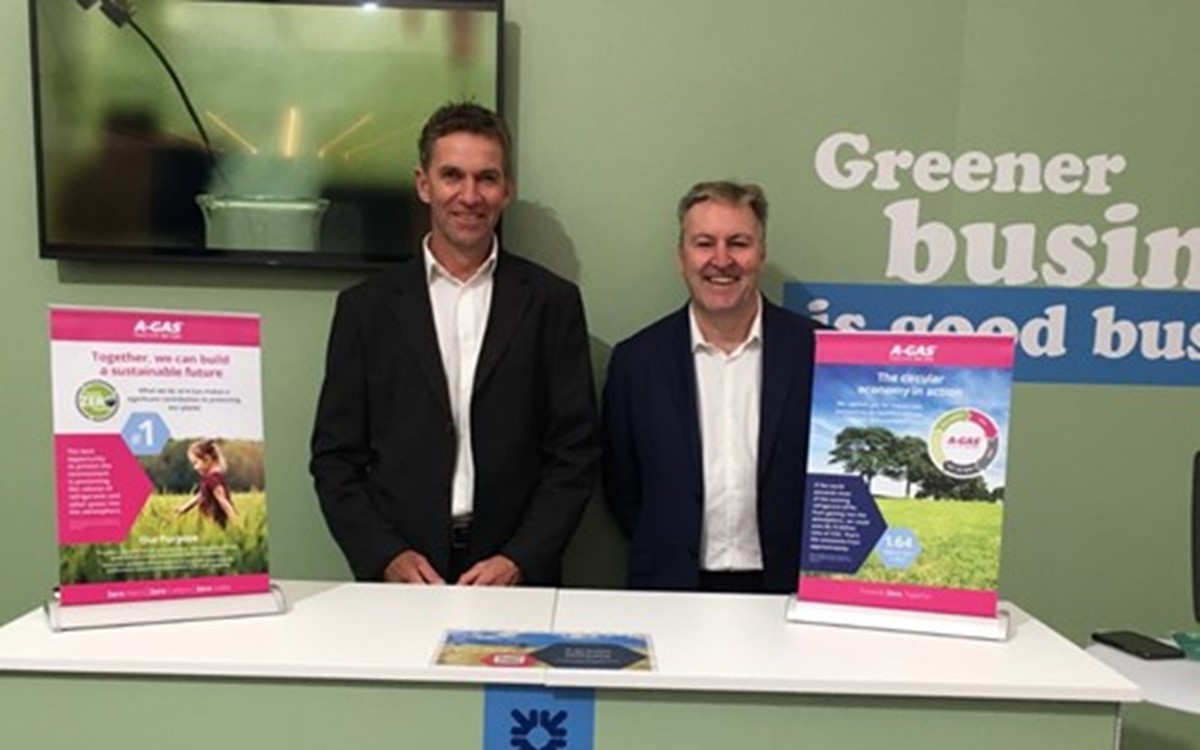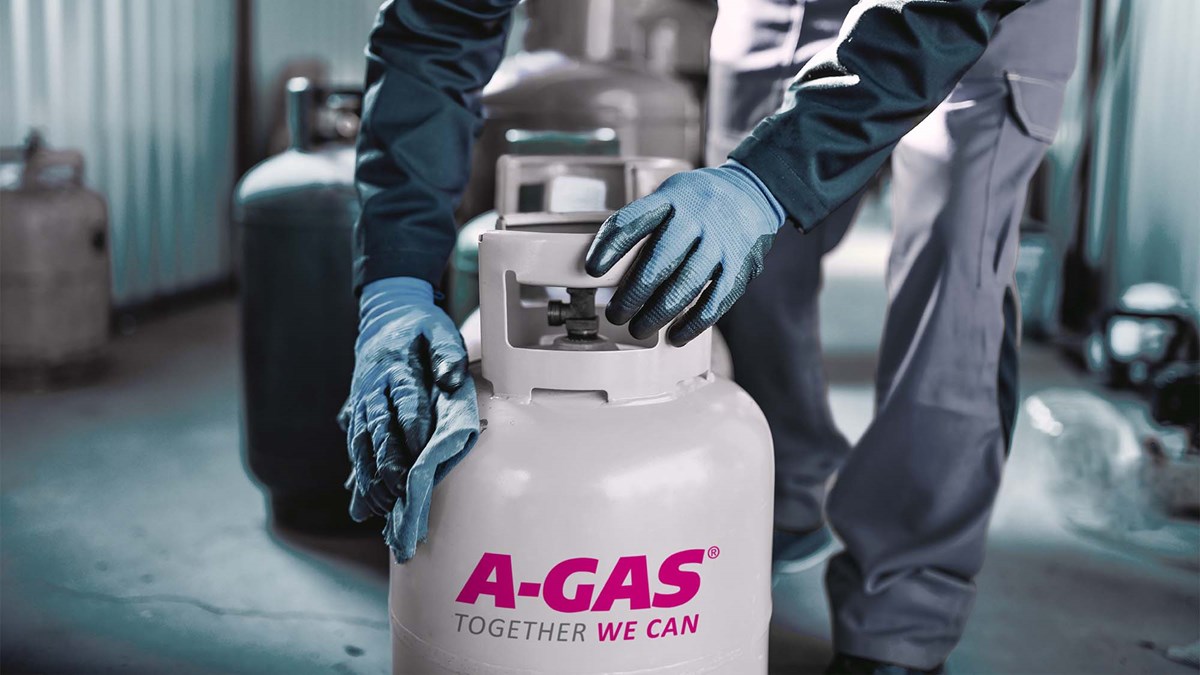Shaping Our Future
A‑Gas Group Commercial Director, Ken Logan attended COP26, and he explains what it will mean for the ACR and heat pump industry.

How we manage our refrigerants in the years to come was one of the issues highlighted at the COP26 Summit in Glasgow. It is likely to take many months and perhaps years to find out if the event will deliver on what it promises in the fight against climate change, but I have no doubt it is already having an influence on our industry.
A‑Gas, in partnership with NatWest Bank, attended COP26 and our stand was located in the Green Zone where sustainability was the theme. It was a real mix of business, environmental groups and individuals who shared the common goals of exploring ways of reducing carbon emissions.
NatWest was a major sponsor at the event and we were among customers they had invited to COP26 who were actively looking at ways to help protect the planet. Visitors to our stand ranged from representatives from political parties, to business people and students.
We made it clear to all we met at COP26 that we had twin aims in the fight to help reduce carbon emissions and to combat global warming. Number one is to supply the lowest global warming refrigerant solution regardless of technology type. Number two is to increase the amount of refrigerant we recover for reclamation or re-purposing. On both counts we are doing this already at A‑Gas, but we know that by working closely with the industry so much more can be achieved in these areas.
Reclaimed refrigerant sent to A‑Gas reprocessing centres undergoes chemical analysis, is cleaned of contaminants and goes through our separation plant to create a product that matches that of virgin refrigerant specification.
Refrigerant sent to A-Gas reprocessing centres becomes fully reclaimed product and is returned to the market in line with the AHRI 700 standard. This is an excellent example of the Circular Economy at work. The opposite to the take, make and dispose business model, and forces us to seek greater efficiencies and make better use of what we have already.
Reclaimed refrigerant is quota free and gases saved from disposal and returned to use reduces the carbon footprint of the industry. They also save on raw material usage, energy consumption and unnecessary transport normally associated with virgin production.
Tools that make refrigerant recovery easier and quicken the process are valuable. A-Gas Rapid Recovery, the F‑Gas compliant on-site recovery service, is a good example of how having the right equipment can make a real difference. The ease with which the refrigerants are removed is made possible by the mobile A-Gas Rapid Recovery teams.
Our twin aims to supply the lowest global warming refrigerant and promote the use of reclaimed refrigerant also ties in with Project Drawdown, an initiative launched by scientists and environmentalist in the US to highlight 100 solutions mankind can implement to slow down global warming.
A-Gas supports the aims of this initiative. Refrigerant management is one of the key solutions highlighted by Project Drawdown. Our message to COP26 was that refrigerant management can play an important role as we look to halt the effects of climate change. Additionally, we explained that effective refrigerant management is part of the solution and not part of the problem.
The fall-out from the wider decisions made at COP will, as I say, take some time to emerge but I am sure it will speed-up the phase down of high global warming refrigerants. The F‑Gas Regulation is still firmly in the spotlight and it’s thrust to phase down the use of HFCs will carry on. The Kigali Amendment to phase down the use of HFCs also marches on; Turkey has become the 129th country to sign up to the agreement.
The F‑Gas Regulation and the Kigali Agreement are making an impact. Among the successes, the use of high global warming virgin refrigerants like R404A and R507 has dropped significantly. Reclaimed refrigerant reaches beyond servicing with OEMs now opting for reclaimed gas in new equipment. In California, the Government has introduced laws that force air conditioning manufacturers to use reclaimed R410A instead of virgin refrigerants.
Progress is also being made in the US, with refrigerants forming a part of the flourishing carbon offset market. This allows high global warming gases to be destroyed and the carbon offset value sold on to a third party. This pragmatic environmental solution, currently not widely adopted in Europe, is leading to the faster phase down of greater amounts of high global warming refrigerants.
Contractors are at the heart of all we do in the refrigeration industry. I admit it may take some time for them to directly feel the benefits that COP26 will bring to the market but there is already evidence that their customers are altering their policies towards climate change.
The Glasgow summit will contribute to this. Big organisations now know more than ever why they need a policy and a plan to reduce their carbon footprint. Contractors can help here by pointing them in the right direction with refrigerant use, whether it be in cooling equipment or heat pumps. By recommending more sustainable solutions to their cooling and heating needs, the installer can have a major influence on what happens in our industry and beyond.
Reclaimed refrigerant provides a sustainable alternative. In many instances there is no need to consider virgin options for new or existing equipment. This is a starting point for our industry and one that can highlight how we can make a difference in the battle to halt climate change.
Attending COP26 was very important to A-Gas; being there showed that we want to be part of the solution. It highlighted our commitment to finding practical ways to deal with the issues facing our industry and mankind. My message to you is to have patience about the outcomes emerging from COP26. They may be with you sooner than you can imagine.
